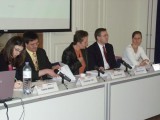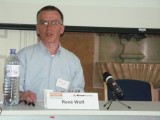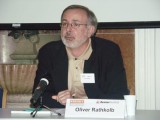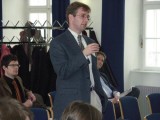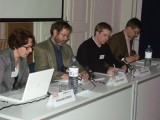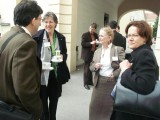After Fascism: Re-Democratization of Western European Society and Political Culture since 1945
Konferenz
Wien, 19. bis 21. Mai 2005
Campus der Universität Wien, Aula, Spitalgasse 2-4, Hof 1, A-1090 Wien
Im Zentrum der von der Stiftung Bruno Kreisky Archiv in Zusammenarbeit mit dem Renner-Institut durchgeführten Konferenz stand die Frage nach dem Umgang europäischer Gesellschaften mit einer nationalsozialistischen bzw. faschistischen Vergangenheit: Die Referenten und Referentinnen aus Europa, Kanada und den USA analysierten und diskutierten Fragen des Aufbaus demokratischer Strukturen, die Rolle der Alliierten in den von ihnen befreiten / besetzten Gebieten, das Entstehen individueller und kollektiver Nachkriegsidentitäten, von Elitenkontinuität und -diskontinuität. Die Aufnahme von Beiträgen ins Tagungsprogramm, die sich mit Dänemark, Deutschland, Frankreich, Italien, Österreich, Portugal, Spanien und Ungarn beschäftigten, ermöglichte eine transnational vergleichende Perspektive auf europäische Gesellschaften "after fascism".
10:00 Welcome
MATTHEW PAUL BERG, John Carroll University
KARL DUFFEK, Renner-Institut
Keynote Speaker: CLEMENS JABLONER, former Chairman of the Historical Commission of the Republic of Austria, President of the Austrian Administrative Court: Transitional Justice
11:00 Panel I: Questions of Guilt and Responsibility
DIANNA TAYLOR, John Carroll University: Crisis and Responsibility.
JAY H. GELLER, University of Tulsa: The German States and Their Jewish Citizens After 1945.
G. DANIEL COHEN, Rice University: “Who Is a Refugee?”: Managing Displacement in the Aftermath of World War II.
12:30 Lunch
14:00 Panel II: Challenges of Democratization I: Re-Fashioning Political Culture
MARIANNE ZEPP, Heinrich Böll Stiftung, Berlin: Re-Education, Citizenship and the
Politics of Democratic Reconstruction. Women` s Politics in the US Occupation Zone.
ROBERT KNIGHT, Loughborough University: From the Third Reich to the Second Republic: Transition and Continuity in the Province of Carinthia.
JÉROME CÔTILLON, Sorbonne: The Reconstruction of the the Right in France After the Second World War.
MATTHEW PAUL BERG: John Carroll University: A Social Democratic Dilemma: Rehabilitating and Re-Integrating Former Nazis in Vienna, 1945/46.
JILL LEWIS: University of Wales Swansea: Rebuilding a Labour Movement: Donawitz.
15:30 Break
16:00 Panel III: Challenges of Democratization II: Aspects of Identity Formation
ALEXANDRA STAUB, Pennsylvania State University: “Einmal im Leben”: Rooting the “Little Man” to Conservative Values in Post-War West Germany.
STEVEN SCHROEDER, University of Notre Dame: Beyond Guilt and Victimhood: Reconciliation in Occupied Germany, 1945-1949
NORBERT GÖTZ, Universität Greifswald: The Making of the Danish Ally: Democracy, Resistance and Symbolic Representation as a United Nation.
17:30 End
9:00 Panel IV: Educating “New” Citizens: Legal and Institutional Considerations
BRIAN M. PUACA, University of North Carolina, Chapel Hill: “To Educate in a New Spirit”: The Democratization of West German Education, 1945–1965.
RICCARDA TORRIANI, Cambridge University: Nazis into Germans. Re-Education and Democratization in the French and British Occupation Zones 1945-1949.
Valerie HÉBERT, University of Toronto: The Politics of Punishment: War Criminals and the Struggle for German Reintegration With the West.
CHRISTOPH JAHR, Humboldt Universität zu Berlin: Democratization and the Defence Against Antisemitism in Post-War Germany.
10:30 Break
11:00 Panel V: Challenges of Democratization III: The Politics of History
SABINE MANKE, Friedrich-Ebert-Stiftung, Bonn: How Fascist Images Can Make a Democratic Ritual Even More Democratic. Willy Brandt and the Misstrauensvotum 1972 in Letters Written by the German Public.
WERNER SUPPANZ, Universität Graz: Traces of Democracy. The Construction of Democratic Austrianness by Means of Memory Politics After 1945.
JOHN HELLMAN, McGill University: The Dark Shadow of Vichy – the Taboos of the French Historians.
ISABELLA MATAUSCHEK, Kulturwissenschaftliches Institut Essen: Family Talk. The German Occupation in the Inter-Generational Dialogue: Denmark and the Netherlands.
12:30 Lunch
14:00 Panel VI: How Does the Economy Fit In?
JAMES C. VAN HOOK, U.S. Department of State: Democracy and Economic Reform in Post-War Germany.
SONJA NIEDERACHER / STEFAN LÜTGENAU, Stiftung Bruno Kreisky Archiv: The Dorotheum Within the Narrative of Economic and “Moral” Reconstruction of the Austrian Civil Service.
15:00 Panel VII: “Democratic” Media?
RENÉ WOLF, Royal Holloway University of London: The Undivided Sky – The 1963 Auschwitz Trial on East and West German Radio.
SUZANNE LANGLOIS, York University: Our Friends in Need. The Contribution of the National Film Board of Canada to Post-War European Reconstruction (1944-1948)
16:00 Break
16:30 Panel VIII: Religious Groups After Fascism
KLAUS GROSSE KRACHT, Zentrum für zeithistorische Forschung, Potsdam: Politics and Religion in Germany 1945-1955: Catholics Between Religious Commitment and Democratic Renewal After World War II.
IRENE BANDHAUER-SCHÖFFMANN, Universität Klagenfurt: Restitution Laws for the Austrian Catholic Church (1945-1960): Dealing With an Ambiguous Nazi Past.
17:30 End
9:00 Panel IX: Reconciliation vs. Retribution
DAVID A. MESSENGER, Carroll College: Exporting Republicanism: The French Government`s Defense of Political Prisoners in Franco's Spain After France's Liberation.
OLIVER B. HEMMERLE, Universität Mannheim: “Wehrwolf,” “Gladio” and the Cold War: After Fascism, Before Democracy?
BÉLA RÁSKY, ELTE Budapest: Intellectual Reflections or Eloquent Silence? The Two Democratizations of Hungary After 1945.
JÜRGEN ZIMMERER, Universidade de Coimbra: Free to Choose? Cold War, Foreign Influence and the Limits of Democratization after the Portuguese Revolution of 1974.
10:30 Break
11:00 Conluding Remarks
MARIA MESNER, Stiftung Bruno Kreisky Archiv
OLIVER RATHKOLB, Universität Wien, Demokratiezentrum Wien
12:00 End
Aus organisatorischen Gründen bitten um Anmeldung unter:
Elisabeth Brandl, Tel.: 01/545 75 35-32, Fax: 01/545 30 97, Email: brandl@kreisky.org
Mit Unterstützung von

Panel I: Questions of Guilt and Responsibility
DIANNA TAYLOR, John Carroll University: Crisis and Responsibility.
This paper argues that Hannah Arendt’s insights concerning the relationship between responsibility, critical reflection, and emancipation are relevant for both post-War Europe and the post-September 11, 2001 United States. I illustrate this relevance by drawing upon Arendt’s work in order to illustrate the interconnection of responsibility and critical reflection. I then show how crisis conditions, defined specifically in terms of what Arendt refers to as a “crisis in meaning,” compromise persons’ ability to engage in critical reflection, in part by promoting uncritical acceptance of the status quo as responsible. I conclude by outlining how Arendt’s work can function as a “guidepost” for persons attempting to promote freedom within post-crisis and crisis conditions.
JAY H. GELLER, University of Tulsa: The German States and Their Jewish Citizens After 1945.
As the Federal Republic of Germany and German Democratic Republic worked to establish legitimacy after fascism, the two states’ relations to the Jewish community and their handling of issues of concern to Jews (including public discourse on culpability for the Holocaust and reparations) had to potential to signal a strong break with the Nazi past. Ironically, the establishment of democracy in West Germany hindered both popular debate on the Nazi past and support for the renascent Jewish community. Only small segment of the political class promoted Holocaust reparations and support for Jewish groups, even these became reality only when political conditions permitted wider acceptance of them. In East Germany, the communist-dominated regime generally adopted a hostile stance towards the Jewish community, which looked to non-communist officials for critical support.
G. DANIEL COHEN, Rice University: “Who is a Refugee?”: Managing Displacement in the Aftermath of World War II.
Often overlooked in the historiography of post-war Europe, the "displaced persons" formed one of the most prominent groups spawned by the aftermath of the conflict. Between the years 1945 and 1951, millions of individuals in Europe were categorized by the abbreviated Anglo-Saxon neologism “DP”. In this short paper, I suggest that the Western administration of displaced persons in occupied Germany offers a unique vantage point to examine the issue of “democracy after fascism” from an international perspective. To what extend did the birth of a “refugee nation” in the heart of occupied Germany indicate a democratic turn after World War Two? To be sure, the selection and classification of DPs clearly reproduced the norms of the “victors’s justice”, with its share of arbitrariness and inconsistencies. Yet this paper argues that democratic values stood at the core of the management of political displacement – a conception of democracy inherently linked to the context of World War Two and the nascent Cold War. First, the post-war refugee system recognized the rights of individuals against the prerogatives of states; it also performed a unique function of historical recognition by acknowledging the victim status of most displaced persons; and it with important consequences for political asylum today, the DP years elicited the rise of the “political dissident” as a distinctive persecuted migrant ought to be protected by international law.
Panel II: Challenges of Democratization I: Re-Fashioning Political Culture
MARIANNE ZEPP, Heinrich Böll Stiftung, Berlin: Re-Education, Citizenship and the Politics of Democratic Reconstruction. Women´s Politics in the US Occupation Zone.
By 1945, the German Reich had ceased to exist and German politics were morally discredited due to the facts of military defeat, responsibility for the outbreak of war, and atrocities committed during the War. Nevertheless, the majority of Germans were convinced that a German national state would continue to exist. Moreover, they clearly expressed their expectation that they would be able to participate in constructing a new political system. As a result, post-War German political elites had to engage in particularly strong efforts to legitimize their policies and actions.
This paper will examine women's politics – as discussed in newspapers, radio programs, official statements and private correspondence – as an example of the rhetorics and practices of legitimation used during the period leading up to Cold War. This will allow an exploration of the function of gender as a categorical argument during this period of transformation. In the following analysis, woman's politics are placed within the context of a period of national reconstruction period and thereby serve as an example for the reconceptualization of national politics in a postwar situation.
1. the establishment of a post-War occupation administration, women founded civic groups and associations in almost all larger German cities. The activists were middle-aged, middle-class women with higher education, whose political socialization had occurred during the Weimar Republic. They were supported by older representatives of the pre-World War II women's movement. To overcome the general disorientation of the immediate post-War period, these women developed a concept of woman´s politics that defined itself largely according to gender differences. Their vantage point was a definition of “National Socialism as a men's state” (Nationalsozialismus als Männerstaat) as contrary to „womanhood“, which postulated that men and women held different levels of responsibility for the rise of Nazism and released women from the overall moral obligation for the regime.
2. Based on the concept of a female sphere, German women´s activists defined women as a social and political interest group. The American reeducation concept identified family as an instrument of political socialization. It provided important support to their articulation of “feminine” interests as relevant to the democratization of post-War Germany. At the same time, they enhanced public politics to not only include their survival struggle and everyday activities but fit into the mold of Western liberal democracy, integrating constitutionalism, social politics into one concept. Thereby these groups engaged in the reconstruction of a national narrative by citing the traditions of the democratic women's movement of the Weimar Republic. Drawing connections to a democratic past served as a means to legitimize their collective activities and helped to institutionalize women´s politics through their independently acting organizations.
3. Through the concept of citizenship, bearing the moral stance of responsibility as well as the quest for female representation, these „Frauenvereine“ developed into lobby organizations within the framework of the Western Zone and then the Federal Republic. Supported by Military Government, i.e. the Women´s Affairs officials, they received funding, educational training and international recognition. These organizations anticipated developments toward sociopolitical modernization and liberalization and were profoundly influenced by international organizations and discourses. Having a considerable prestige during the Occupation period and in the transition to the founding years of the Federal Republic, their influence seized due to the development of an institutionalized political agenda and a hierarchic order. As a result, they fell victim to the ideological contradictions of the Cold War and women's politics in West Germany for a long period of time took place at the (nearly) invisible level of civic associations and lobby associations.
ROBERT KNIGHT, Loughborough University: From the Third Reich to the Second Republic: Transition and Continuity in the Province of Carinthia.
The paper examines the transition from National Socialism to ‘post-Nazi politics’ attempt in the Austrian province of Carinthia. Its starting-point is a relatively intact society in which Nazi rule was able to function relatively smoothly until the end. The possible explanations for this are discussed, in particular the mobilising potential of the ideology and image of the Marchland (Grenzland). The collapse of Nazi rule came almost literally at one minute before midnight and was a negotiated transition intended to present a government with which the British occupation authorities could do business and above all to forestall the approaching Yugoslav partisans. Throughout the transition the continued strength of the Marchland traditions are evidence. They can be also be seen, with adaptions, in the language of the Social Democrats, who were to establish a long dominance within the provinces. The contrary account of the transition as the triumph of a resistance movement is treated with due scepticism.
MATTHEW PAUL BERG: John Carroll University: A Social Democratic Dilemma: Rehabilitating and Re-Integrating Former Nazis in Vienna, 1945/46.
Upon the collapse of National Socialist control in Austria, many who had joined the NSDAP sought to re-establish their former political affiliation. Access to employment, housing, and even improved rations for thousands of Austrians depended upon patronage extended by one the three recognized democratic parties: the Austrian Socialist Party (SPÖ), the Austrian People’s Party (ÖVP), or the Austrian Communist Party (KPÖ). This was certainly the case in Vienna, where Austrian Socialists rapidly reasserted the city’s interwar status as a social democratic citadel. This paper examines the phenomenon of re-integrating former into the SPÖ from the perspective of ordinary Viennese who had cleared denazification screening and sought to rehabilitate themselves on the one hand, and party authorities who placed a premium on rebuilding the municipal party organization and membership base on the other.
JILL LEWIS: University of Wales Swansea: Rebuilding a Labour Movement: Donawitz.
This paper discusses the significance of the 1947 works council elections in the Donawitz steel plant in Upper Styria in the British zone of occupation in Austria. The plant, which was essential to the post-war Austrian economy, became known as a Communist stronghold after May 1945 when the KPÖ gained control of its works council. By the time of the second round of elections in 1947, in the first phase of the Cold War, a schism was evident within the Austrian Trade Union Federation: whilst its Socialist leadership was advocating political consensus in pursuit of a permanent role in the formation of national policy, the KPÖ was attempting to build popular support by encouraging industrial protest. Donawitz workers, who had a tradition of political volatility, came to symbolise the battle beween these conflicting strategies, but proved that their behaviour was still unpredictable – they followed the Communist out on strike, but then voted for the Socialists.
Panel III: Challenges of Democratization II: Aspects of Identity Formation
ALEXANDRA STAUB, Pennsylvania State University: “Einmal im Leben”: Rooting the “Little Man” to Conservative Values in Postwar West Germany.
Postwar West Germany was split between social renewal and the retention of old values. The Adenauer era (1949-62) became synonymous with an economic boom, but also saw a lingering problem of displaced and bombed-out families who were in need of new homes. Whereas prewar municipal governments had attempted to alleviate Germany's housing shortage through rental housing programs (often with communal facilities), such as the modern housing designed in Frankfurt or Berlin, post-War efforts took on a more conservative tenor, stressing individual home ownership as a means of establishing social and economic stability. Aided by homeownership programs such as the erstes und zweites Wohnungsbaugesetz (First and Second Housing Laws), the worker and small-time employee was now seen as a potential and coveted home owner, reinforcing both a Blut und Boden emphasis on being "tied to the land" as well as introducing American-led values of material consumption.
This paper examines how prefabricated houses – because of their guaranteed low price often the only type of home the "little man" could afford – and moving images in the form of popular German films helped to introduce the dream of home ownership to a German social class more familiar with labor movements than with lawn mowers. With two German firms – Okal and Neckermann – quickly establishing dominance on the market, the actual range of house plans offered and bought remained fairly limited. Spatial standardization thus gave rise to an increased political and social conformity, and helped cement conservative German positions on such issues as “propriety” in the area of social mores, gender roles, and family life.
Popular films dealing with domestic life, and aimed at a female audience, gave further "instruction" on the creation and use of home, especially to those women who had spent much of the war as household heads. Such moving images gave an insider's view on how (usually upper class) families lived in their houses, and how the spaces were to be used. The availability of prefab houses, and moving images of idealized domestic life became powerful tools in establishing the concepts of both home ownership and of "proper" domestic arrangements, thus helping to solidify a patriarchal and conservative communal structure for many years to come.
STEVEN SCHROEDER, University of Notre Dame: Beyond Guilt and Victimhood: Reconciliation in Occupied Germany, 1945-1949.
This paper addresses the topic of reconciliation in the three western zones of occupied Germany through examples from German political bodies, and German and international NGOs. I argue that, although the immediate postwar period in Germany has typically been viewed as an era of disaster and conservative reconstruction, this period also witnessed significant German attempts to reconcile with Germany’s wartime enemies. Moreover, even conservative groups admitted certain aspects of German guilt and responsibility while attempting to further their own respective interests and goals under the pressures of Allied occupation. Taken together, these examples reveal an active environment of reflection and overt attempts toward reconciliation in occupied Germany – attempts which continued to yield positive results after the formation of the Federal Republic in 1949.
NORBERT GÖTZ, Universität Greifswald: The Making of the Danish Ally: Democracy, Resistance and Symbolic Representation as a United Nation.
Denmark has been known as Hitler's 'model protectorate' and is, indeed, a very special case. She was the only country under nazi occupation maintaining a democratic government for the larger part of the war. In March 1943 the occupying power even granted democratic elections, in which the Danish nazis were not able to mobilize but marginal support. It was not before August the same year that the democratic government resigned and gave way to a technocratic regime of collaboration by the higher state administration. At the same time the resistance movement became ever more active and established the 'Freedom Council', a sort of grassroots government substitute.
Neither the German Nazis nor indigenous fascist movements ever became a dominant force in Denmark that would have seriously threatened democratic political culture. The main reason for this is the internal strength of this culture, but Hitler's preference for more pragmatic, smoothly working solutions over sympathetic Quisling regimes without backing in the population was also of importance. Nevertheless, at the end of the war, the country's leadership was divided in the traditional democratic parties and exponents of the political system which had compromised themselves by their collaboration with the German Nazis on the one hand and representatives of the various branches of the resistance movement, which comprised the whole political spectrum from communism via democracy to right wing groups, on the other.
The question for post-war Denmark was, therefore, how to integrate two different traditions, the constitutional tradition, closely linked to a democratic culture of compromise and consensus, and the activist tradition of 'fighting Denmark'. This was primarily a domestic issue, but it had an international dimension as well. The task was both to become a united Nation and one of the United Nations.
As regards the domestic development both groups, disagreeing on much, felt that national reconciliation was desirable and that they needed each other for post-war reconstruction. The resistance movement lacked the political legitimacy of democratically elected representatives of the people while the politicians were in the need of the moral capital of the resistance fighters. Thus, a bipartite interim government was formed after liberation on 5 May 1945, which was negotiated between both groups.
To get invited to the San Francisco Conference and become one of the founding members of the United Nations was the only major foreign policy goal of this government. Basically, this was the litmus test for both the legitimacy of the policy of democratic collaboration and respect for the spirit and deeds of the resistance movement. A failure could have severely hampered the understanding between politicians and resistance fighters. But the retrospect acceptance of Denmark as an allied nation in June 1945 enhanced the country's internal settlement of regular democratic representatives and those getting engaged in a state of emergency.
Panel IV: Educating “New” Citizens: Legal and Institutional Considerations
BRIAN M. PUACA, University of North Carolina, Chapel Hill: “To Educate in a New Spirit”: The Democratization of West German Education, 1945–1965.
Scholars often assert that the schools of immediate post-WWII Germany represent a restoration of pre-Nazi education. This project argues that long before the protest movements of the late-1960s, the West German educational system was undergoing meaningful reform from within. German teachers, principals, pupils, textbook authors, and parents initiated change at the local level through the introduction of a variety of curricular and pedagogical innovations. The establishment of exchange programs between the United States and West Germany, the formation of student government organizations, the publication of revised history and civics textbooks, and the creation of a Social Studies curriculum all contributed to the advent of a new German educational system after 1945. These changes were designed to prepare West German pupils for their responsibilities in the young democracy. Far from a simple “restoration” of pre-Nazi ideals, postwar West German education represented a synthesis of tradition and reform.
RICCARDA TORRIANI, Cambridge University: Nazis into Germans. Re-education and Democratization in the French and British Occupation Zones 1945-1949.
Although both the French and the British aimed at an introduction of liberal democracy in post-1945 Germany, a comparison of the history textbooks licensed and used under French and British occupation shows a number of differences. Most generally, re-writing the German past was seen as a matter that could not be left to the Germans in the French Zone, whereas in the British Zone, any British interference was strongly discouraged. This becomes evident both with respect to the policies adopted regarding the production of new, post-fascist textbooks, as well as with respect to the changes in content and focus that we can observe in the books used after 1945. In fact, these variations point to more fundamental differences in the approaches to democratisation pursued by the two smaller Western Allies.
Valerie HÉBERT, University of Toronto: The Politics of Punishment: War Criminals and the Struggle for German Reintegration With the West.
This paper examines the German - American negotiations over the early release of Wehrmacht officers convicted of war crimes. The US organized and prosecuted High Command Case of 1948 had been carried out with a view to educating the German people about the criminal activities of the Wehrmacht during the war. However early and persistent demands by the West German government, the press and veterans’ associations for the amnesty of imprisoned soldiers made clear that these lessons had not taken root. The Americans were reluctant to abandon the principle of punishment of convicted war criminals and the goal of reconciling the German people to the criminal past of one of their most respected institutions. Nonetheless, the US’ desire to reintegrate West Germany into plans for the defense of the West ultimately eclipsed these initial aims.
CHRISTOPH JAHR, Humboldt Universität zu Berlin: Democratization and the Defence Against Antisemitism in Post-War Germany.
My paper will examine the legal defence against Antisemitism in the first decade after the foundation of the Federal Republic of Germany. The Allied Authorities considered the treatment of the Jews in Germany by their non-Jewish neighbours as the true measure of the German people’s progress towards democracy. Consequently, the alteration of German attitudes towards Jews and Antisemitism was part of the re-education process and closely linked to the re-evaluation not only of the „Weimar-Experience“, but also of the anti-Jewish policy pursued by the Nazi regime. But it was not “the saving grace of education” alone that played an important role here. Court rulings dealing with the Nazi past and/or neo-fascist activities paved the way for amendments of the Criminal Code. They also became important milestones in the emergence of the Verfassungsgerichtsbarkeit (Supreme Court Ruling). At the same time antisemitic attitudes were increasingly scandalised. Although this process was by no means free from setbacks and frictions it played a crucial role in the emergence of a self-sustaining civil society in the late 1950s. But the diminution of Antisemitism in Germany turned out to be a very long range problem. The current debate in Germany shows that the public discourse is still centred around „the state“ although it seems that finally German society has learned the lesson that a social movement like Antisemitism can not be supressed by judicial means alone.
Panel V: Challenges of Democratization III: The Politics of History
SABINE MANKE, Friedrich-Ebert-Stiftung, Bonn: How Fascist Images Can Make a Democratic Ritual Even More Democratic. Willy Brandt and the Misstrauensvotum 1972 in Letters Written by the German Public.
The paper will focus on the (longterm-)relationship of conflictuous history, cultural imagination and political processes. Following approaches in an interdisciplinary field outlined by cultural anthropology, political philosophy, sociology, and psychoanalysis it will describe the fabric as well as the fabrication of German collective identity in the early 1970s. By the example of the West German non-confidence vote in 1972 – and specifically by means of letters written to Chancellor Willy Brandt in relation with this event by the general public – it will show how images from a fascist, nationalsocialistic past create and fuel a process of national formation in the name of democratic values.
WERNER SUPPANZ, Universität Graz: Traces of Democracy. The Construction of Democratic Austrianness by Means of Memory Politics After 1945.
In the Austrian memory politics after the Second World War the search for a democratic tradition in Austria`s history throughout the centuries played an important part in the strategy of self-victimization. The means was to construct a tendency to democracy in Austrian history and the ascription of a “democratizing” meaning to historical events and persons. The aim was to prove a politico-cultural difference to Germany: While in German history a tendency to fascism was imagined as inherent, Austrian history was conceived of as essentially anti-fascist and leading to a democratic tradition. However, Austrian memory politics was heterogeneous with respect to the positions of the political parties: The aim of the paper is to analyse the hegemonic and the minoritarian concepts of “democratic lines” in the Austrian memory politics between the end of the war 1945 and the State Treaty 1955, on the basis of examples like the interpretations of the 1848 Revolution or of the Austro-Prussian enmity. Emphasis is put on the discourse on austrofascism and Nazi fascism in the context of the search for a democratic tradition. Finally, the question is to be raised which role the invention of a democratic tradition can play in the process of democratization of a society.
JOHN HELLMAN, McGill University: The Dark Shadow of Vichy – the Taboos of the French Historians.
Research on World War II France was long constrained by taboos on several subjects: large extreme right veteran’s movements, French initiatives to collaborate with the Germans, the French arrest and deportation of Jews, the rivalries in the Resistance. Few French historians studied German archives, or the work of German scholars, on the period. A few Paris-based academics, subject to political pressures, decided who would study, and what would be studied, taught, and published, about the war. From the 1960s, scholars from outside of France, investigative journalists, and some younger French historians, began breaking down taboos, one after the other. Today most of the scholarship on World War II France considered authoritative is of foreign authorship, and has helped effect a major change in French collective memory of that period.
ISABELLA MATAUSCHEK, Kulturwissenschaftliches Institut Essen: Family Talk. The German Occupation in the Inter-Generational Dialogue: Denmark and the Netherlands.
In this paper I set out to address the question what can be gained by a change of perspective from the official culture of commemoration to the private sphere of family tradition. What can we learn about processes of reception and discursive production of meaning when we turn our attention to families discussing the German occupation and the Second World War? However separate one should not forget that family memory is strongly interrelated with nationalised representations and discourses of the past and can at times in turn influence and shape official representations of the past. The questions raised thus concern the dynamic interplay between private and official public memories of the past and explore the role of family traditions and generational belonging on the formation of historical consciousness.
Panel VI: How Does the Economy Fit In?
JAMES C. VAN HOOK, U.S. Department of State: Democracy and Economic Reform in Postwar Germany.
The post-war economic reforms adopted in West Germany in 1948 and known as the social market economy proved fundamental to the prosperity that underpinned a democratic political culture in the Federal Republic. This paper explores the economic policy debates that culminated in the social market economy. It will thereby examine the relationships between economic policy debates, mid-twentieth century theories of political economy, and specific historical interpretations of Germany’s economic and industrial past. The author hopes to contribute a political-economic perspective on the extent to which post-war Germans, and their allied occupiers, addressed the German past at least implicitly, in seeking a new economy that could support a new democracy.
SONJA NIEDERACHER / STEFAN LÜTGENAU, Stiftung Bruno Kreisky Archiv: The Dorotheum Within the Narrative of Economic and “Moral” Reconstruction of the Austrian Civil Service.
The Dorotheum, one of the oldest publicly owned and state controlled pawn and auction houses in Europe, and one of the oldest functioning economic entities in Vienna, had a unique position in the Austrian economy through its legal construction. Though economically independent, the Dorotheum was closely connected to the ruling political elites in terms its overall structure and in terms of its management. Austria’s First Republic, as well as the Dollfuß-Schuschnigg and National Socialist regimes, shaped its management and thus organized the Dorotheum as an economic enterprise in their own interests. The Dorotheum, rich in tradition, can be regarded as a mirror of political, social, legal, and economics shifts within Austria during these crucial decades. This pattern was continued after 1945 when the political leadership of Austria’s second republic shaped the Dorotheum’s management and business model anew.
This case study examines how the Dorotheum presented the fascist period in its business history and constructed the company’s role between 1938 and 1945. With an anniversary publication of 1957 taken as an example this paper shows the correlations of the Dorotheum’s narrative to Austrian interpretations of the recent history. Furthermore it explores the reconstruction of its business and management model from 1945 to 1956 in order to gain important insights into the connections between the construction of a corporate identity and a corporate narrative of the institution’s role and business history during the Third Reich and “after fascism”.
Panel VII: “Democratic” Media?
RENÉ WOLF, Royal Holloway University of London: The Undivided Sky – The 1963 Auschwitz Trial on East and West German Radio.
In the Cold War climate of the early 1960s divided Germany the Nazi past was just as much part of the ideological debate as the rivalries between the superpowers. The differing interpretations of the causes and consequences of the 12 year dictatorship were being played out in the mass media, particularly on radio. The height of this “broadcast war” is the focus of this study, the 1963 -1965 Auschwitz Trial in Frankfurt. Whether this ideological battle played a significant part in the Vergangenheitsbewältigung (coming-to-terms with the past) is investigated by analysing the programmes from East and West German broadcasters and their respective audiences.
SUZANNE LANGLOIS, York University: Our Friends in Need. The Contribution of the National Film Board of Canada to Post-war European Reconstruction (1944-1948).
This presentation examines the contribution of the National Film Board of Canada (NFB) in supporting and maintaining public commitment for the reconstruction efforts of the United Nations in post-war Europe. The NFB was one of the most active film production unit contributing to this concerted campaign of international cooperation. The films insisted on the urgency of immediate help as well as long-term reconstruction and the necessity to re-affirm the political and moral values of democracy and human rights. The NFB productions reached wide audiences in the Americas and in the refugee camps administered by UNRRA (United Nations Relief and Rehabilitation Administration). They have played a significant role during the transitional period between war and peace by sustaining long-term favourable public opinion for the common goal of rebuilding democratic culture in Europe.
Panel VIII: Religious Groups After Fascism
KLAUS GROSSE KRACHT, Zentrum für zeithistorische Forschung, Potsdam: Politics and Religion in Germany 1945-1955: Catholics Between Religious Commitment and Democratic Renewal After World War II.
The collapse of the ‘Third Reich’ gave rise to a brief, but intensive, revival of Christian religiosity in Germany. Seen as less corrupted by the Nazi state than other social institutions, the Churches played an important part in the moral und civil reorientation of the German population in the immediate post-war period. The paper outlines the political und social importance of the Roman Catholic Church during the first years after World War II. Special attention will be given to the activities of Catholic laymen who were committed to the idea of Catholic Action, i.e. the Re-Christianisation of society. Although these groups were highly bound to the moral and social teachings of the Church, they became at the beginnings of the 1950s more and more integrated into the political and social founding consensus of the new West-German state. Thus, the old sceptical attitudes of large parts of German Catholicism towards the principles of modern democracy were eventually replaced by a new “consensus Catholicism” which affirmed its political und moral agreement with the majority of the German population rather than its differences.
IRENE BANDHAUER-SCHÖFFMANN, Universität Klagenfurt: Restitution Laws for the Austrian Catholic Church (1945-1960): Dealing With an Ambiguous Nazi Past.
The paper will analyze how the Catholic Church in Austria dealt with ambiguities surrounding the Nazi past after the war and how the Austrian government treated the Catholic Church in regard to their claims for restitution. After Austria became part of Nazi Germany in 1938, the Austrian Catholic Church – treated differently from the Christian churches in Germany – experienced a dramatically high loss of church property. Due to the fact that the Austrian Catholic Church never fundamentally opposed Nazism, and in some regards shared the same ideological background (e. g. anti-Semitism), restitution of church property was a highly controversial issue. Additionally, the socialists who formed a coalition with the Catholic People’s Party from 1945 to 1966 still remembered the Catholic church’s strong support for the semi-fascist regime of Dollfuss and Schuschnigg (1933–1938). In the mid-1950s Socialists’ anti-clerical attitude shifted towards a compromise with the Catholic Church, seeking for a lasting clerical neutrality in political affairs. The political discussion about the restitution of church property intensified after the State Treaty of 1955 and lasted until 1960 when Austria and the Vatican finally settled all claims. Restitution laws prevented an open discussion about the church’s support for the Nazis and the political deal with the Socialists enabled the Catholic Church to see itself purely as a “victim” of Nazism.
Panel IX: Reconciliation vs. Retribution
DAVID A. MESSENGER, Carroll College: Exporting Republicanism: The French Government`s Defense of Political Prisoners in Franco's Spain After France's Liberation.
During and after the Spanish Civil War of 1936-39, the Spanish regime of General Francisco Franco systematically used its resources to 'purge' society of political activists and others with ties to the Spanish Republic that it had defeated. While official repression diminished after the Second World War in terms of sheer numbers arrested, tried and executed, it still continued. Beginning in 1944, a number of Spaniards who had been part of the French Resistance and then returned clandestinely to Spain, were arrested, tried, and given death sentences. A sense of shared republicanism with these individuals, a feeling of debt to them for their service to France and a Resistance vision of a post-war world where foreign policy was formed in moral terms derived from the war against Nazism, combined to encourage many French leftists and Resistance veterans to try to save the lives of their comrades. Pressure was put on the government in Paris to prove its commitment to Republicanism and morality by intervening in Madrid in the cases of these Spaniards. By January 1946, the Government had intervened in at least 62 cases. Such activism ultimately led to pressure on the French Government to do more to try and remove Franco from power, and a series of sanctions were adopted against Spain in 1946. By focusing on the case of French interventions in Madrid, this paper will examine democratic reconstruction in postwar France by emphasizing the significance of a particular Resistance ‘vision’ for a new foreign policy and its relationship to government policy.
OLIVER B. HEMMERLE, Universität Mannheim: “Wehrwolf,” “Gladio” and the Cold War: After Fascism, Before Democracy?
Whereas an ardent Nazi resistance organised as "Wehrwolf" remained – apart from some desperate incidents – not more than the last propaganda myth of Nazi Germany, the re-integration of former Nazi/Fascist officials in the Western intelligence services during the Cold War is a matter of historical fact. The paper does not focus on new historical evidence concerning these two interlinking-contradictory post-WW II developments, but analyses the question, how these non-events/events and their perception from the 1950s to the 1990s shaped the Re-Democratisation of Western Europe. Thereby – for the purpose of argument – the Democratisation of (West) Germany and Italy is regarded as a rather unlikely development – at least from the perspective of the late 1940s and 1950s.
BÉLA RÁSKY, ELTE Budapest: Intellectual Reflections or Eloquent Silence? The Two Democratizations of Hungary After 1945.
Shortly after 1945, Hungary was ready to discuss the political (and moral) failure of her society: It was ready for democratisation, ready to face the catastrophes and crimes of its anti-democratic interwar regimes. The works of István Bibó were – and still are – a landmark how great parts of the Hungarian society started to discuss the question of responsibility. For three years a democratic society had to chance to clarify the distorted character of Hungarian society which in 1944 had arrived at a "dead-end street", as Bibó has put it.
After the communist take-over this coming to terms, the establishment of a democratic discourse on the accountability of the Hungarian elite and society was banned from the public. After he revolution of 1956, the soft Kádár-Regime did not grant any possibility for a free discourse on the Hungarian past: After 1956 everything connected to history seemed to be a danger for the legitimacy of the regime. And both – the regime and the society – chose oblivion as the easiest way to overcome all painful pasts – and not – even clandestine – clarification. It was a silent compromise of the dominators and the dominated. Even the democratic opposition in the early eighties contributed in many – but not in all – ways to this silence.
So after 1989 Hungarian society had to be democratised again – and had to face two dictatorships overcome. Still concentrating on the question of coming to terms with the fascist past, I will try to examine why the Hungarian society – this time under liberal circumstances – seems to be less successful to face this past than the short-lived democracy after 1945: Hungary disposes of all Western expressions and vocabularies of memory and political culture, on the other hand, the everyday political discussions, actions and fights still leave the question open whether these institutions are deeply embedded in the Hungarian political culture or are only mere symbols of manners and conduct enforced from the outside.
JÜRGEN ZIMMERER, Universidade de Coimbra: Free to Choose? Cold War, Foreign Influence and the Limits of Democratization after the Portuguese Revolution of 1974.
During the Cold War the question of a state's political system was not only the choice of its own citizens. The Hungarian revolution of 1956 and the liberalisation in Czechoslovakia in 1968 were subsequently met by brute force and both communist rule and membership in the Warsaw Pact were secured. Intervention into the political development of another state (at least as long as it was a European one) is commonly seen as a strategy deployed within the Soviet sphere of influence. How did the NATO alliance react to a similar challenge? An obvious test case is Portugal after the revolution of 1974, in which a group of young officers toppled the oldest authoritarian regime in Europe. And for a few heavily contested month after the coup the possibility seemed real, that Portugal would turn into a socialist country, leave NATO and seek closer relationship the so called Eastern Bloc. Its western allies would not allow this, and regardless of the unresolved question, whether NATO planned an invasion in Portugal, got involved into Portuguese politics. The more moderate "Partido Socialista" of Mário Soares was heavily supported and partly financed by the USA, Germany and others. And politicians such as Willy Brandt were campaigning for Soares in Portugal. By doing so, they secured the victory of the pro-western forces and prohibited a more radical course. For strategic reasons during the Cold War, the Portuguese people were not entirely free to choose their own government.


